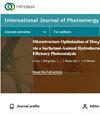深度学习在缺失数据预测太阳辐照度中的应用
IF 2.1
4区 工程技术
Q3 CHEMISTRY, PHYSICAL
引用次数: 0
摘要
预测太阳辐照度的任务对可再生能源的发展至关重要。这项研究旨在预测光伏电站的辐照度或功率,并作为电网稳定性的标准。在实际情况下,数据缺失会大大降低预测精度。同时,由于不知道数据集的分布情况,在建模之前很难选择合适的插值方法。此外,并不是所有的数据集都能从使用相同的输入技术中获得相同的收益。本研究建议在数据缺失的情况下,利用配备自适应神经输入模块(ANIM)的递归神经网络(RNN)来估计太阳直射度。在没有输入信息的情况下,典型工程即将到来的4小时辐照度取决于古代气候和辐照记录的空白。投影模型通过模拟每个输入序列中的缺失数据来评估广泛可用的信息。在一系列缺失率和输入参数下,评估了性能模型的替代imputation技术。结果表明,在各种标准下,所提出的方法都优于竞争策略。此外,将该方法与注意机制相结合,发现它在弱光条件下表现出色。本文章由计算机程序翻译,如有差异,请以英文原文为准。
Application of Deep Learning to the Prediction of Solar Irradiance through Missing Data
The task of predicting solar irradiance is critical in the development of renewable energy sources. This research is aimed at predicting the photovoltaic plant’s irradiance or power and serving as a standard for grid stability. In practical situations, missing data can drastically diminish prediction precision. Meanwhile, it is tough to pick an appropriate imputation approach before modeling because of not knowing the distribution of datasets. Furthermore, not all datasets benefit equally from using the same imputation technique. This research suggests utilizing a recurrent neural network (RNN) equipped with an adaptive neural imputation module (ANIM) to estimate direct solar irradiance when some data is missing. Without imputed information, the typical projects’ imminent 4-hour irradiance depends on gaps in antique climatic and irradiation records. The projected model is evaluated on the widely available information by simulating missing data in each input series. The performance model is assessed alternative imputation techniques under a range of missing rates and input parameters. The outcomes prove that the suggested methods perform better than competing strategies when measured by various criteria. Moreover, combine the methodology with the attentive mechanism and invent that it excels in low-light conditions.
求助全文
通过发布文献求助,成功后即可免费获取论文全文。
去求助
来源期刊
CiteScore
6.00
自引率
3.10%
发文量
128
审稿时长
3.6 months
期刊介绍:
International Journal of Photoenergy is a peer-reviewed, open access journal that publishes original research articles as well as review articles in all areas of photoenergy. The journal consolidates research activities in photochemistry and solar energy utilization into a single and unique forum for discussing and sharing knowledge.
The journal covers the following topics and applications:
- Photocatalysis
- Photostability and Toxicity of Drugs and UV-Photoprotection
- Solar Energy
- Artificial Light Harvesting Systems
- Photomedicine
- Photo Nanosystems
- Nano Tools for Solar Energy and Photochemistry
- Solar Chemistry
- Photochromism
- Organic Light-Emitting Diodes
- PV Systems
- Nano Structured Solar Cells

 求助内容:
求助内容: 应助结果提醒方式:
应助结果提醒方式:


